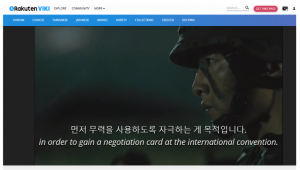Opportunity
Since the 1990s when the Korean Wave (hallyu) spread throughout the world through today, viewership in Korean dramas has been steadily increasing. With a consumer base comprised mostly of millenials and women, viewers turn to these television shows for a number of reasons, from wanting to experience another culture to desiring to binge-watch stories, to simply wanting to experience a better plot than can be found in other shows. There are hundreds of Korean dramas today, and the quality and quantity of these shows is steadily increasing. Because of these show’s wide potential appeal, there are two primary opportunities: 1) a way of getting these shows onto the screens of everyone outside South Korea in a timely fashion and 2) a way to subtitle and localize these in a viewer’s preferred language.
Solution
Viki was founded in 2007 to provide internationals access to Korean dramas. Viki solves the problem of translation and localization by using crowdsourcing to subtitle shows. These community contributions are driven by intrinsic motivation, as users are not paid for their work. There are, however, certain recognition tiers for those who hit a threshold (Qualified Contributor status) granting subtitlers special perks, such as access to exclusive content. Viewers can track the completion of subtitles on a newly released show (unsubtitled shows are available on Viki a few hours after being shown in South Korea), and can either choose to watch the show before all the subtitles are complete, or wait until the shows are 100% subtitled in their language (a process that can take <24 hours from its premiere in South Korea). With close to 200 available language subtitles, Viki can provide any of its show to users in nearly any language, provided the community has contributed to produce its subtitles.
For each show, there is a designated team which includes language moderators who ensure the accuracy of subtitles. When the subtitles meet quality standards, the team leader (called the “Channel manager”) locks them to prevent further editing
Additionally, in 2017, Viki launched “Learn Mode” where viewers can watch shows with two sets of subtitles – their own language and that of another. In addition to helping users learn, this also improves the community’s ability to provide future subtitles. They also have the ability to pause the show at any time and highlight a word in the subtitle to learn pronunciation and spelling.
Effectiveness & Competitive Landscape
Significant market adoption (over 35 million monthly active users) has demonstrated Viki’s success in bringing new sources of content and providing suitable translations of that content. Academic research such as that done by researchers at Carnegie Mellon has likewise shown that the crowdsourcing model on which Viki relies for Active Crowd Translation (ACT) can approach the quality level of an expert in the field, giving its translation model further legitimacy.
In sizing the relevant addressable market for Viki, there are two industries of note: the market for translation services, and the market for television and movie entertainment. The total market size for translation services in the US is estimated at $5 billion per year. Furthermore, TV and Movie content production and distribution are estimated at revenues of $100 billion market per year in the US. Viki operates in both of these industries, and specializes in the intersection between the two, as well as how translation of entertainment content in the former opens up greater market opportunities for the latter. Because of the widely recognized wisdom that “content is king” and the race to find timely and unique streaming content first in a competitive market, that intersection has taken on ever-increasing importance.
In terms of revenue, Viki has three main streams: ads, viewer subscriptions, and licensed syndication of subtitled content to other distributors (e.g., Hulu, Yahoo, and Netflix). Viewers have the option of joining Viki for free, however this will force them to watch many ads throughout the course of a show or limit the number of episodes they can see.
Competitors in the television and movie streaming market, such as Netflix (which started streaming Korean dramas in 2015), Dramafever, and Hulu, have the ability to offer similar entertainment. However, their current Korean drama selection is mostly limited to older, “classic” series and they do not seem to have arrangements to onboard every new drama as quickly onto their platform. Meanwhile, competitors in the traditional translation and localization space lack the technology and distribution capabilities that Viki has.
Improvements & Suggestions
We see a number of opportunities for improvement within Viki’s product through a combination of machine learning, new business partnerships, and expansion into adjacent geographic markets and new content formats.
- Use of machine learning to assist with crowdsourced translation. Viki can start off by building a simple translation system that can detect translation errors and propose suggestions to users based on language-specific rules. For instance, literal translations often ignore grammar, context and the meaning behind idiomatic expressions, such as “letting the cat out of the bag”. Given the number of companies, such as Google and Facebook, that are invested in neural machine translation, we believe that over time, Viki can partner with them to build a more complex solution that uses a combination of speech and image recognition to improve the accuracy of users’ translations. Such a partnership could be deeply beneficial to a technology company such as Google, because while Google has previously deeply indexed text content such as books, websites, and academic articles, its efforts in entertainment content have been more limited, and could help them compete against rival Amazon, who owns imdb.com. Such an arrangement could also further improve the quality and robustness of their data for machine translation and speech-to-text transcription. Additionally, machine learning could supplement easier, common subtitles (for example, the words “hello” or “watch out!”), reducing the need to translate these easier phrases. Greater reliance on assistive machine learning techniques could also be used to: (1) reduce the typical 1-day delay between when shows air and when subtitles are available on Viki and (2) encourage users who can speak and write in less popular subtitle languages to contribute.
- Use a translate plugin: Both Microsoft & Google have simple speech to text converters with options to translate content into multiple languages. This could be used as a stop gap arrangement to immediately launch shows when they become available with more detailed subtitles coming in < 24 hours.
-
Expand to more shows and countries by partnering with other content providers. Viki can expand on existing partnerships with production companies to offer a wider selection of dramas. By extending, as well as signing on new, long-term contracts (potentially ones where Viki can co-produce dramas), Viki can increase customer retention and acquire new users.
- Incentivizing multi-lingual members with more diverse rewards. Currently, volunteer translators are granted a free Viki subscription, badges, and some exclusive promotions. Viki can improve upon their rewards system by offering rewards on their partner platforms, such as Netflix, Samsung, and Fuji TV, and could even consider allowing Gold-status qualified contributors early access to content related to the shows they translate. This could further incentivize users to provide more and higher quality translations.
- Expanding into adjacent markets for translating popular books, manga, and music. In the same way that television and movies require intensive effort to be translated and localized, books, manga, and music are similar forms of media that could likewise be translated through crowdsourcing. Because these are all forms of content that are already made available through subscription-based models (like Viki), the same model could readily be applied to them as well. A ready first candidate for partnership in this area could be Amazon, which already has millions of subscribers to its Kindle Unlimited service for books, and which already has an extensive presence in many parts of the world with unique content that could appeal to users in other countries.
Sources
https://en.wikipedia.org/wiki/Viki_(website)
https://support.viki.com/hc/en-us/articles/215075068-Qualified-Contributor-QC-Status
https://www.nytimes.com/2018/02/07/watching/k-drama-streaming-guide.html
https://www.cnbc.com/2017/01/09/netflix-bets-on-korean-drama-for-expansion.html
https://techcrunch.com/2017/08/03/facebook-finishes-its-move-to-neural-machine-translation/
http://clients1.ibisworld.com.proxy.uchicago.edu/reports/us/industry/keystatistics.aspx?entid=1245 http://clients1.ibisworld.com.proxy.uchicago.edu/reports/us/industry/keystatistics.aspx?entid=1246
http://clients1.ibisworld.com.proxy.uchicago.edu/reports/us/industry/keystatistics.aspx?entid=1446
https://www.linkedin.com/pulse/video-streaming-race-overview-leopold-w-hofmann/?published=t
https://www.linkedin.com/pulse/video-streaming-race-some-thoughts-future-leopold-w-hofmann/
http://citeseerx.ist.psu.edu/viewdoc/summary?doi=10.1.1.164.9485
https://www.silkstream.net/blog/2014/07/content-is-king-bill-gates-1996.html
Team
Siddhant Dube
Eileen Feng
Nathan Stornetta
Tiffany Ho
Christina Xiong


